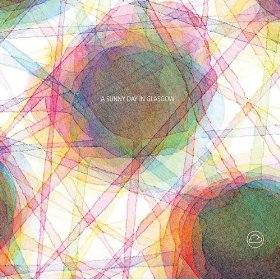A Sunny Day In Glasgow’s 2007 début, Scribble Mural Comic Journal, was a charming piece of psych-pop, drawing plaudits from all the usual suspects who like that sort of thing. Much of this was due to the expansiveness of the album’s sound, which belied its humble genesis: it was recorded into a single microphone in the bedroom of A Sunny Day…’s lynchpin, Ben Daniels.
Two years on, and success has given Daniels a budget to match his ambition, allowing him to assemble an expanded corps of musicians in a larger studio. Initial impressions are of business as usual, particularly by the time time ‘Failure’ pounds its way into view, the crisply tribal percussion a counterpoint to the washes of synth and reverb. By focussing on this reverb, A Sunny Day… set themselves apart from the current pack of Animal Collectivists: much has been made of the studio technique of playing back the recordings into the room and repeatedly capturing progressive layers of echo until they form a dense, shimmering whole. It’s as if Daniels is so glad to get out of his bedroom that he feels compelled to demonstrate his new-found freedom on as large a scale as possible.
Attempting to use the room as an instrument has its inherent drawbacks, not least of which is the way in which what should be a comforting sheen instead feels homogeneous. The lack of variegation makes for a consistent album, to be sure, but leaves an after-impression of blandness, exacerbated by tracks which segue into each other, repeating former themes until they are indistinguishable.
Yet despite these limitations, and some frankly pointless (if mercifully brief) ambient interludes, Ashes Grammar should not be completely dismissed. Throughout, Daniels’ loping bass both underpins and cuts through the wall of sound, its bouncing melodies drawing notice to tunes that might otherwise remain buried in the mire. Strangely, assuming that by this point the listener hasn’t simply glazed over, the album does actually improve as it goes on, with stand-out tracks ‘Blood White’ and ‘Headphone Space’ consigned to the final third, and intelligible lyrics emerging by the mid-point.
Ultimately, in trying to expand on his vision — an admirable aim — Daniels has put aside what made earlier efforts so intriguing. One of the pleasures of Scribble Mural . . . was the way in which it overcame its limitations, with numerous ideas itching to make themselves heard above the tape hiss. In Ashes Grammar, one instead finds a single idea — to sound a bit like the Cocteau Twins — teased out and lacquered with echo, until it collapses under its own weight. Once Daniels realises that the greatest creativity can come from constraint, he might be on to a winner.


